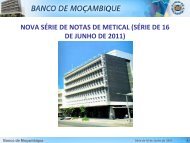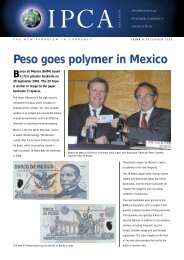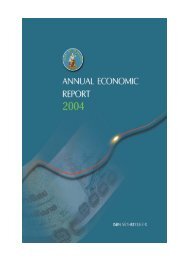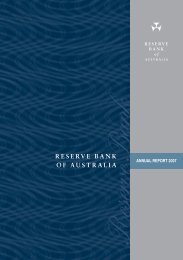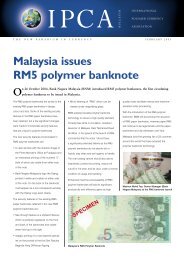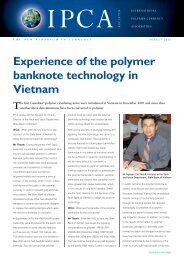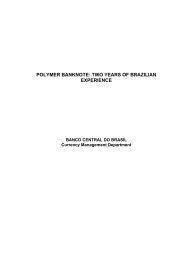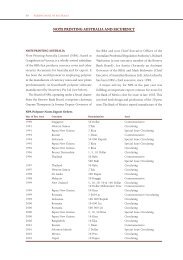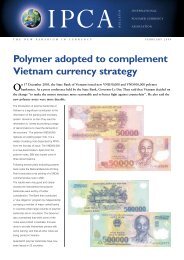ANNUAL REPORT 2008 - Polymer Bank Notes of the World
ANNUAL REPORT 2008 - Polymer Bank Notes of the World
ANNUAL REPORT 2008 - Polymer Bank Notes of the World
You also want an ePaper? Increase the reach of your titles
YUMPU automatically turns print PDFs into web optimized ePapers that Google loves.
which it emphasised that ten years after <strong>the</strong> introduction <strong>of</strong> <strong>the</strong> euro, <strong>the</strong> currency is a success.The Commission also put forward several proposals to improve coordination and surveillancewithin EMU, to enhance <strong>the</strong> euro area’s international role and to promote effective governance<strong>of</strong> EMU.The ECOFIN Council discussed <strong>the</strong> first ten years <strong>of</strong> EMU at its meeting <strong>of</strong> 7 October <strong>2008</strong>.Ministers concluded that EMU had contributed to macroeconomic stability over <strong>the</strong> past ten yearsand that, following <strong>the</strong> reform processes within EMU, <strong>the</strong> EU was now better equipped to copewith economic shocks. In order to reap fur<strong>the</strong>r benefits from EMU and to improve <strong>the</strong> economicperformance <strong>of</strong> Member States, <strong>the</strong> ECOFIN Council agreed on several proposals, includingi) better monitoring <strong>of</strong> competitiveness developments (particularly in countries participating in<strong>the</strong> euro area and ERM II), ii) a prioritisation <strong>of</strong> structural reform recommendations in orderto take account <strong>of</strong> <strong>the</strong> economic situation and iii) measures to better account for <strong>the</strong> effects <strong>of</strong>economic cycles, and related cycles in asset prices, on tax revenues.The European Parliament also adopted a resolution on <strong>the</strong> first ten years <strong>of</strong> EMU(see Chapter 6).The general conclusion emerging from <strong>the</strong> reflections on <strong>the</strong> first ten years <strong>of</strong> EMU was thatEMU’s institutional set-up works well. However, to make EMU a continued success, policymakersneed to be firmly committed to <strong>the</strong> objectives agreed at <strong>the</strong> European level and vigorouslyimplement <strong>the</strong> necessary policies.1.2 INSTITUTIONAL ISSUESTHE TREATY OF LISBONFollowing <strong>the</strong> signing <strong>of</strong> <strong>the</strong> Treaty <strong>of</strong> Lisbonby <strong>the</strong> Heads <strong>of</strong> State or Government on13 December 2007, Member States started <strong>the</strong>ratification procedure in accordance with <strong>the</strong>irrespective constitutional requirements. So far,23 Member States have ratified <strong>the</strong> LisbonTreaty. Germany and Poland are very close t<strong>of</strong>ormal completion <strong>of</strong> <strong>the</strong> ratification procedure.In <strong>the</strong> Czech Republic, parliamentary ratificationis still pending.In Ireland, <strong>the</strong> Lisbon Treaty was submittedto a binding referendum and failed to achievemajority support. Against this background, <strong>the</strong>European Council at its meeting on 19-20 June<strong>2008</strong> reiterated that <strong>the</strong> Lisbon Treaty, withits aim “to help an enlarged Union act moreeffectively and more democratically”, shouldstill be pursued. At <strong>the</strong> European Councilmeeting on 11-12 December <strong>2008</strong>, <strong>the</strong> Heads<strong>of</strong> State or Government agreed to give “legalguarantees” to Ireland following <strong>the</strong> rejection <strong>of</strong><strong>the</strong> Lisbon Treaty. The Irish government madea commitment to seek ratification <strong>of</strong> <strong>the</strong> LisbonTreaty by <strong>the</strong> end <strong>of</strong> <strong>the</strong> term <strong>of</strong> <strong>the</strong> currentEuropean Commission.CONVERGENCE <strong>REPORT</strong>SIn line with Article 122 <strong>of</strong> <strong>the</strong> Treaty, <strong>the</strong>ECB and <strong>the</strong> European Commission preparedconvergence reports on <strong>the</strong> progress madeby Bulgaria, <strong>the</strong> Czech Republic, Estonia,Latvia, Lithuania, Hungary, Poland, Romania,Slovakia and Sweden in meeting <strong>the</strong> conditionsto join <strong>the</strong> euro area. In <strong>the</strong>se reports, whichwere published on 7 May <strong>2008</strong>, Slovakia wasassessed in somewhat more depth than <strong>the</strong>o<strong>the</strong>r countries because <strong>the</strong> Slovak authoritieshad submitted a request for an examinationin view <strong>of</strong> Slovakia’s intention to adopt <strong>the</strong>euro as <strong>of</strong> 1 January 2009. On <strong>the</strong> basis <strong>of</strong> aproposal from <strong>the</strong> Commission, <strong>the</strong> ECOFINCouncil decided on 8 July <strong>2008</strong> that Slovakiafulfilled <strong>the</strong> conditions to join <strong>the</strong> euro area on1 January 2009 (see Chapter 3).ECBAnnual Report<strong>2008</strong>175



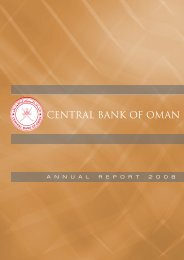
![KNOW YOUR NEW GIBRALTAR BANKNOTES - [Home] bThe/b](https://img.yumpu.com/50890985/1/184x260/know-your-new-gibraltar-banknotes-home-bthe-b.jpg?quality=85)
![PAPUA NEW GUINEA - [Home] - Polymer Bank Notes of the World](https://img.yumpu.com/49758743/1/190x143/papua-new-guinea-home-polymer-bank-notes-of-the-world.jpg?quality=85)

